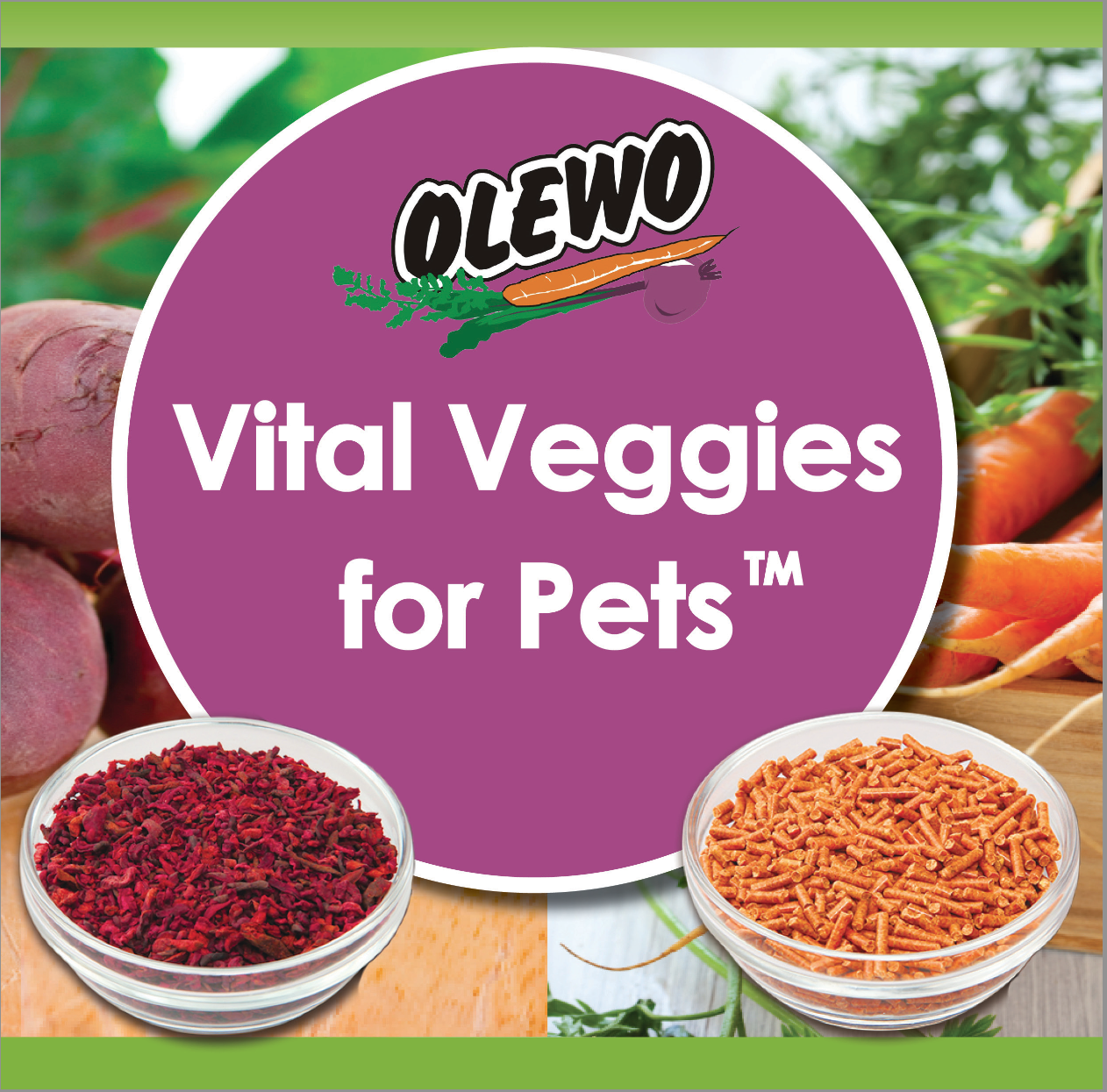By Candace T. Botha
Sarasota Pet Magazine
As a responsible pet owner, you pride yourself on giving your dog the very best food you can buy at your local pet food store. What’s more, you also may provide your pup with a daily, chewable, “vitamin-rich” supplement to ensure that you are meeting all of your pet’s nutritional needs.
But did you know that, despite your good intentions, you actually may be robbing your dog of the important, natural nutrients he needs to live a healthy and long life?
Here’s why: there is a radical difference between natural vitamins found in whole foods and the synthetic vitamins that most pet foods and supplements contain. When choosing foods and supplements for your dogs, it is imperative to consider the level of nutrients they provide—if, in fact, they offer any nutritional value at all!
A Close-Up Look at Pet Foods
Many kibble and canned dog foods now on the market do contain wholesome, healthy ingredients, including fruits, vegetables and meats—just look at those colorful packages! However, most of these commercial pet foods are highly processed with extreme heat. Consequently, many of the natural nutrients these healthy foods offer are virtually either depleted or completely destroyed.
Even the healthiest pet food ingredients may be suspiciously lacking in natural nutrients for a variety of environmental reasons, including:
- Depletion of nutrients in the soil from overuse
- Pesticide contamination that limits how plants produce and store nutrients
- Fertilizers that potentially annihilate the nutritional content of fresh fruits and vegetables.
But pet foods and chewable supplements do contain vitamins and minerals, right? It says so on the package label! Yes, there are nutrients, but they are not the wholesome, natural nutrients your dog’s body needs or can use efficiently.
Here’s the cold, hard truth: Pet food manufacturers spray a “premix” of synthetic nutrients on the food after it has been processed in an attempt to restore the natural nutrients that have been destroyed in the production process. By adding this premix to the food, the manufacturers earn the right to include “complete and balanced nutrition” on the packaging labels. What’s more, the addition of these “nutrients” enables manufacturers to meet the most minimal standards of The Association of American Feed Control Officials (AAFCO), the pet food industry’s regulatory agency.
Quite simply, this practice deceives consumers and spells danger.
What about chewable supplements; aren’t they nutrient-rich? Unless the label includes “100 percent natural,” “100 percent plant-based” or “100 percent animal-based,” you can bet your pet is getting an unhealthy dose of synthetic vitamins.
The Hidden Hazards of Synthetic Vitamins
Just what are synthetic vitamins, anyway?
The definition of the term “synthetic” really is quite elementary: it means an ingredient is a substance or mixture of substances that do not occur anywhere in nature.
Unlike natural, whole-food vitamins that are “living substances,” synthetic nutrients are not alive nor do they come from natural sources. Most likely, they have been formulated in a test tube and added into highly processed foods that have been stripped of their naturally occurring nutrients. Synthetic vitamins attempt to mimic the way vitamins and minerals from natural food sources act in our bodies, but, in truth, they deprive the body of the vital, natural nutrients it needs.
Natural vitamins, on the other hand, are the “whole enchilada.” They include critical micronutrients—including anti-oxidants, co-enzymes, trace minerals and more—that work in synchronization to nourish and protect the body’s cells and foster good health.
Synthetic vitamins are “isolates,” which means that they do not contain the entire spectrum of components that are found in their natural counterparts. They are, so to speak, the enchilada without the tortilla and cheese—critical ingredients have been removed, simply because they are less expensive and more profitable to produce, and they also have longer shelf lives.
According to The Organic Consumers Association, the body cannot use isolated vitamins in the same way it uses natural vitamins, and this can have deadly consequences. For example, because synthetic vitamins are lacking in trace minerals, these important micronutrients may be depleted from the body’s own mineral reserve as it attempts to metabolize the artificial vitamins. The result: life-threatening deficiencies can develop.
Here’s the bottom line: Synthetic vitamins that are added to pet food or chewable supplements are nothing more than chemicals that you are putting in your pet’s body. The body treats them in the same way as any other chemical or drug that is ingested.
Most alarming is the fact these synthetic vitamins actually are unsafe, unhealthy toxins that can accumulate in the body and can lead to disease and even premature death. Intuitive as it is, the body knows how to recognize natural vitamins, metabolize them efficiently and use what it needs before excreting the excess.
It’s simply not so with synthetic vitamins. They are not recognizable to the body and are more difficult to absorb and excrete, thus creating havoc with the kidneys (Kidney disease has, in fact, become the second leading cause of death in dogs.). They also can build up in the body over time, simply because the body doesn’t know what to do with them. And, like with any other toxins in the system, serious diseases can develop over time.
According to Dr. Keith Ungar, DC, a chiropractor and functional medicine practitioner with The Center for Natural Medicine in Akron, Ohio, “Synthetic vitamins…have no function without the support of the micronutrients you’ll find in whole food vitamins. The metabolism of these unwanted synthetic vitamins can lead to vitamin overdoses and imbalances in body chemistry.”
What’s in Your Pet’s Food & Supplements?
Here are clues you can use to help you determine if your pet is ingesting synthetic vitamins:
- Read the labels! Ingredients that end in “ate” or “ide” are a telltale sign that the product contains salt forms, which are, in fact, synthetics. (Examples: hydrochloride, nitrate)
- The use of the letters “dl” before any ingredient is another indication that the supplement is synthetic. (Example: dl-alpha tocopherol is a synthetic form of Vitamin E).
- An absence of natural food sources, such as fish, vegetables, citrus or yeast, on the food or supplement’s label means the product is synthetic.
- Different forms of salt, including acetate, chloride, hydrochloride, nitrate, bitartrate and succinate—all of which end in “ate” or “ide”—are synthetic ingredients added to foods and supplements to increase their stability and lengthen their shelf lives.
The Myth Behind “Natural” Claims
Okay, you say to yourself; my pet’s food or supplement is not synthetic, because the label says “natural,” right?
The sad truth is that food and supplement manufacturers can use the word “natural” on the label even if only 10 percent of the ingredients in the product come from natural food sources!
In other words, up to 90 percent of the ingredients in the “natural” food or supplement you are giving your pet actually could be synthetic!
The Healthy, All Natural Alternative: Nutrient-Rich Olewo Pet Food Supplements
For more than 35 years, Olewo Carrots and Olewo Red Beets have been proven and trusted as leading, all-natural pet food supplements that provide a powerhouse of natural nutrients to foster optimal health and promote longevity.
Both additive and preservative free, Olewo pet food supplements are in no way genetically modified and, even more importantly, they contain no synthetic vitamins. In fact, the only ingredients in the product are 100% fresh, premium carrots and 100% fresh, premium red beets—not beet pulp.
Cultivated in the rich, fertile soils of northern Germany, a country that long has been a leader in organic farming, the carrots and red beets go to preparation immediately after they are harvested, and then are gently dehydrated to preserve all of the vegetables’ natural nutrients. And these whole-food nutrients are plentiful!
In addition to the natural, whole-food nutrients they provide, Olewo Carrots and Olewo Red Beets provide premium sources of fiber, and most importantly, are easy to digest. The vegetable supplements are convenient to use and can be added to kibble, canned food, a raw food diet and home-cooked meals for a daily dose of natural vitamins and minerals.
Optimal nutritional advantages are only part of the reason reputable dog breeders, animal group representatives and health-conscious pet owners choose Olewo Carrots and Olewo Red Beets. The pet food supplements not only can be used for good-health maintenance and preventative care, but also as safe and natural remedies for a variety of common canine health conditions.
Best known for their ability to resolve diarrhea in dogs—often after just two days of feeding—Olewo Carrots also cure stomach upset and loose stool, relieve dry and itchy skin, and add a healthy sheen to dull, lifeless coats. The pet food supplement also is an all-natural dewormer and effectively can eliminate a variety of dangerous parasite’s from a dogs intestines and colon.
Olewo Red Beets are very effective in naturally relieving skin allergies in dogs and itchy dog skin because of the detoxification and anti-inflammatory support they provide. The pet food supplement helps promote healthy metabolism and aids in weight management. The unique combination of powerful antioxidants and anti-inflammatory properties make Olewo Red Beets the ideal supplement to help prevent disease and certain cancers.
And here’s the good news: A daily serving of 1 teaspoon to 2-plus tablespoons (which is dependent on your dog’s weight) of Olewo Carrots and Olewo Red Beets eliminates the need for expensive, chewable supplements that are chock full of synthetic vitamins.
Ultimately, the choice is yours: Are you willing to risk your dog’s health by providing foods and chewable supplements that contain chemicals disguised as nutrients, or do you prefer the whole-food vitamins and minerals harvested from two of Mother Nature’s most nutrient-rich vegetables and found in Olewo Carrots and Olewo Red Beets?
Resources:
Group, Dr. Edward, III, DC, ND, DACB N, DCBCN, DABFM. “The Differences Between Synthetic and Natural Vitamins.” GlobalHealingCenter.com. 2 Jan. 2009. Web. 22 July 2014.
Meyers, Cheryl. “How to Tell if a Vitamin is Natural or Synthetic.” FoodMatters.com. n.d. Web. 23 July 2014.
Pulsipher, Charlie. “Natural vs. Synthetic Vitamins—What’s the Big Difference?” SunWarrior.com. 2 Jan. 2014. Web. 22 July 2014.
Scott, Dana. “The Truth About Dog Food Supplements.” DogsNaturally.com. n.d. Web. 23 July 2014.
Ungar, Dr. Keith, DC. “Whole Food Versus Synthetic Vitamins.” TheWellnessDoc.com. 2007. Web. 22 July 2014.


